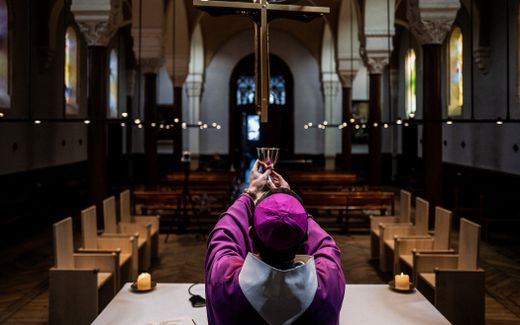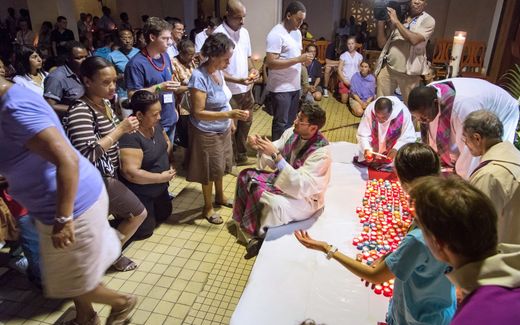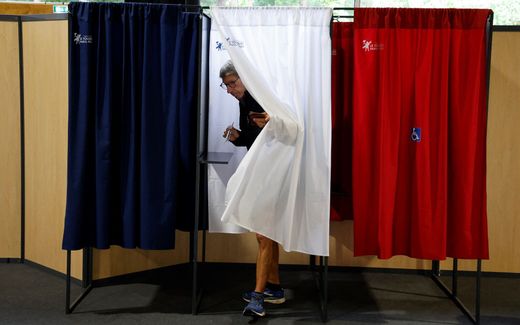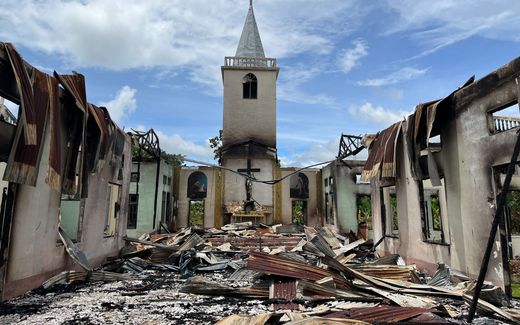Newcomers change the face of the evangelical Protestants in France

Volunteers from Royal Cite evangelical megachurch in Paris, France, hold up signs that read, "Smile, you are beautiful" for visitors. Photo Canva.com, AFP, Julien De Rosa
Christian Life
The evangelical movement in France is growing. But not only with people of French origin. Marc Derœux tells how the new developments can lead to humourous misunderstandings.
At a recent interfaith conference in my city, I was honoured to moderate the event's discussion as a pastor. A wonderfully kind woman addressed me as an "evangelist pastor." After those words, I smiled inwardly, that she had confused "evangelist" with "evangelical."
This mix-up, though minor, represents the confusing terminology in French Protestantism today. It also reflects, in its way, the deep transformations currently reshaping this pluralistic religious landscape.
What is an evangelical?
The Protestant Federation of France (FPF) recently commissioned an IFOP survey to assess the current beliefs and practices of Protestants in France. The results were made public at its General Assembly in January 2025.
Already, the subtleties of our vocabulary are drawing attention. The woman who misnamed me so gently illustrates this identity divide perfectly. Some believe the term "evangelical" refers to someone disciplined in religious practices such as regular Bible reading or consistent worship attendance. However, the term more accurately refers to a person whose primary vocation is proclaiming the Gospel, much like having a missionary or itinerant role. We still speak of the first evangelists: Matthew, Mark, Luke, and John!
The survey reveals that while Protestants still make up about 2 per cent of the French population (approximately 1.32 million people), an internal transformation is underway—subtle yet significant. Today, nearly 33 per cent of French Protestants identify with the evangelical movement, up from 20 per cent in 2010.
This shift signals a changing paradigm: evangelical churches, often rooted in African, Caribbean, or Asian diasporas, are establishing themselves in France's religious fabric. Their energy, communal grounding, and ability to speak to youth and those searching for spiritual direction are helping to reshape the map of French Protestantism.
Declining practice
However, the survey shows a noticeable decline in traditional practices. Weekly Bible reading among Protestants is now at 20 per cent, compared to 34 per cent in earlier figures. Church attendance is also down. While this disengagement is concerning, it does not affect all groups equally. "Historical" Protestants –Lutherans and Reformed– see their numbers dwindle and struggle to pass on the faith to younger generations.
In contrast, evangelical churches are remarkably robust: 39 per cent of their members read the Bible regularly, and 36 per cent attend church weekly. This contrast highlights a more profound spiritual commitment in these communities, often fueled by a strong sense of belonging and a vibrant communal life.
Evangelical or evangelist?
This anecdote –and the broader conversations it sparks– reveals a crucial and symbolic issue: the need for clarity in language. As a Baptist evangelical pastor, I know terminology is not just a verbal decoration. It reflects an identity in the making — sometimes shifting, sometimes assertive.
When a kind and sincere woman calls me an "evangelist pastor," it expresses the full complexity of a Protestantism influx. Labels alone can no longer capture the evolving reality where historical legacies coexist with modern aspirations.
Conversion
Another key insight from the survey lies in the dynamics of conversion. At least 72 per cent of those who convert to Protestantism come from Catholic backgrounds, a telling figure that points to a search for spiritual renewal and a sense of continuity.
Conversion is no longer necessarily a break with the past but often a personal reclaiming of Christian heritage — more intimate, embodied, and participatory. In evangelical churches, this experience is frequently marked by a rediscovery of Bible reading, communal prayer, and active involvement in church life.
Finally, beyond worship practices, the survey highlights Protestants' strong social commitment. Whether evangelical or not, many are involved in community organisations, solidarity initiatives, and ethical or environmental causes. This engagement far exceeds the national average.It reflects a faith in action—one that is not content with doctrine alone but seeks to make a tangible impact on the world. So, even if some traditional religious forms appear to be weakening, the core values of the Protestant faith—freedom of conscience, individual responsibility, and active solidarity—continue to inspire and shape French society. During my recent conference, that humourous misunderstanding opens the door to a broader reflection on Protestantism's evolving identity.
Like a lively debate, words and practices are being redefined in a world searching for meaning. They invite each of us to rethink how we live, share, and pass on the faith in a constantly moving society. Why not us?
Related Articles









